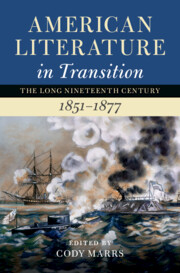Book contents
- American Literature in Transition, 1851–1877
- Nineteenth-Century American Literature in Transition
- American Literature in Transition, 1851–1877
- Copyright page
- Contents
- Figures
- Contributors
- Series Preface
- Introduction
- Part I Careers
- Part II Networks
- Chapter 8 Newspapers and Periodicals
- Chapter 9 Transamerican Literature
- Chapter 10 Oceanic Literature
- Chapter 11 Romanticism
- Chapter 12 Realism
- Part III Exchanges
- Part IV The Long Civil War
- Index
Chapter 9 - Transamerican Literature
from Part II - Networks
Published online by Cambridge University Press: 15 June 2022
- American Literature in Transition, 1851–1877
- Nineteenth-Century American Literature in Transition
- American Literature in Transition, 1851–1877
- Copyright page
- Contents
- Figures
- Contributors
- Series Preface
- Introduction
- Part I Careers
- Part II Networks
- Chapter 8 Newspapers and Periodicals
- Chapter 9 Transamerican Literature
- Chapter 10 Oceanic Literature
- Chapter 11 Romanticism
- Chapter 12 Realism
- Part III Exchanges
- Part IV The Long Civil War
- Index
Summary
More than four decades before the USA and Spain engaged in the open warfare that resulted in the end of direct Spanish imperialism in the western hemisphere, a minor diplomatic incident nearly plunged the two countries into early war. On February 28, 1854, the cargo steamship the Black Warrior entered the port of Havana as it had dozens of times previously, but on this occasion, the ship was seized by the Spanish colonial authorities. Under the leadership of Captain Bullock, the ship, with its cargo of goods and transit passengers, was detained, accused of failing to pay taxes on the commercial goods. A dispute over a mere technicality about the ship’s right to modify its customs declarations escalated into a full-blown international incident that immediately drew national and international attention, and even US President Pierce and the House of Representatives issued an official public inquiry into the matter.1 After several weeks of tense exchange and negotiations, the ship and its cargo were released with a fine of approximately $6000. The matter had, it seemed, been put to rest; however, the fallout of the affair simmered and intensified, threatening to trigger a war and exposing some of the most important issues affecting the nation.
Keywords
- Type
- Chapter
- Information
- American Literature in Transition, 1851–1877 , pp. 145 - 158Publisher: Cambridge University PressPrint publication year: 2022

